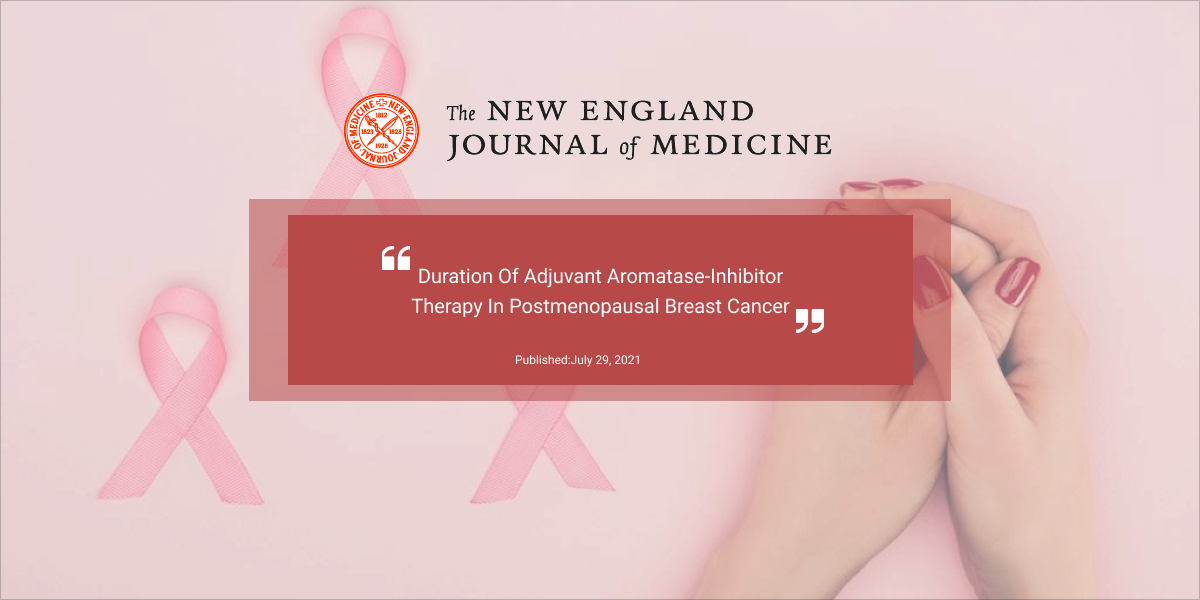Duration of Adjuvant Aromatase-Inhibitor Therapy in Postmenopausal Breast Cancer

Duration of Adjuvant Aromatase-Inhibitor Therapy in Postmenopausal Breast Cancer
BACKGROUND
For postmenopausal women with hormone-receptor–positive breast cancer, the most effective duration for adjuvant therapy with an aromatase inhibitor remains unclear.
METHODS
In this prospective, phase 3 trial, we randomly assigned postmenopausal women with hormone-receptor–positive breast cancer who had received 5 years of adjuvant endocrine therapy to receive the aromatase inhibitor anastrozole for an additional 2 years (2-year group, receiving a total of 7 years) or an additional 5 years (5-year group, receiving a total of 10 years). The primary end point was disease-free survival. The primary analysis included all the patients who were still participating in the trial and who had no recurrence 2 years after randomization (i.e., when treatment in the 2-year group had ended). Secondary end points were overall survival, contralateral breast cancer, second primary cancer, and clinical bone fracture.
RESULTS
Among the 3484 women who were enrolled in the trial, 3208 remained in the trial without disease progression after the first 2 years of extended anastrozole treatment following randomization. Among these women, disease progression or death occurred in 335 women in each treatment group in the primary-analysis set at 8 years (hazard ratio, 0.99; 95% confidence interval [CI], 0.85 to 1.15; P=0.90). No between-group differences occurred in most secondary end points, and subgroup analyses did not indicate differences in any particular subgroup. The risk of clinical bone fracture was higher in the 5-year group than in the 2-year group (hazard ratio, 1.35; 95% CI, 1.00 to 1.84).
CONCLUSIONS
In postmenopausal women with hormone-receptor–positive breast cancer who had received 5 years of adjuvant endocrine therapy, extending hormone therapy by 5 years provided no benefit over a 2-year extension but was associated with a greater risk of bone fracture. (Funded by AstraZeneca and the Austrian Breast and Colorectal Cancer Study Group; ABCSG-16/SALSA ClinicalTrials.gov number, NCT00295620. opens in new tab.)
![]() Michael Gnant, M.D., Florian Fitzal, M.D., Gabriel Rinnerthaler, M.D., Guenther G. Steger, M.D., Sigrun Greil-Ressler, M.D., Marija Balic, M.D., Dietmar Heck, M.D., Raimund Jakesz, M.D., Josef Thaler, M.D., Daniel Egle, M.D., Diether Manfreda, M.D., Vesna Bjelic-Radisic, M.D., et al., for the Austrian Breast and Colorectal Cancer Study Group
Michael Gnant, M.D., Florian Fitzal, M.D., Gabriel Rinnerthaler, M.D., Guenther G. Steger, M.D., Sigrun Greil-Ressler, M.D., Marija Balic, M.D., Dietmar Heck, M.D., Raimund Jakesz, M.D., Josef Thaler, M.D., Daniel Egle, M.D., Diether Manfreda, M.D., Vesna Bjelic-Radisic, M.D., et al., for the Austrian Breast and Colorectal Cancer Study Group
This article was updated on July 29, 2021, at NEJM.org.

